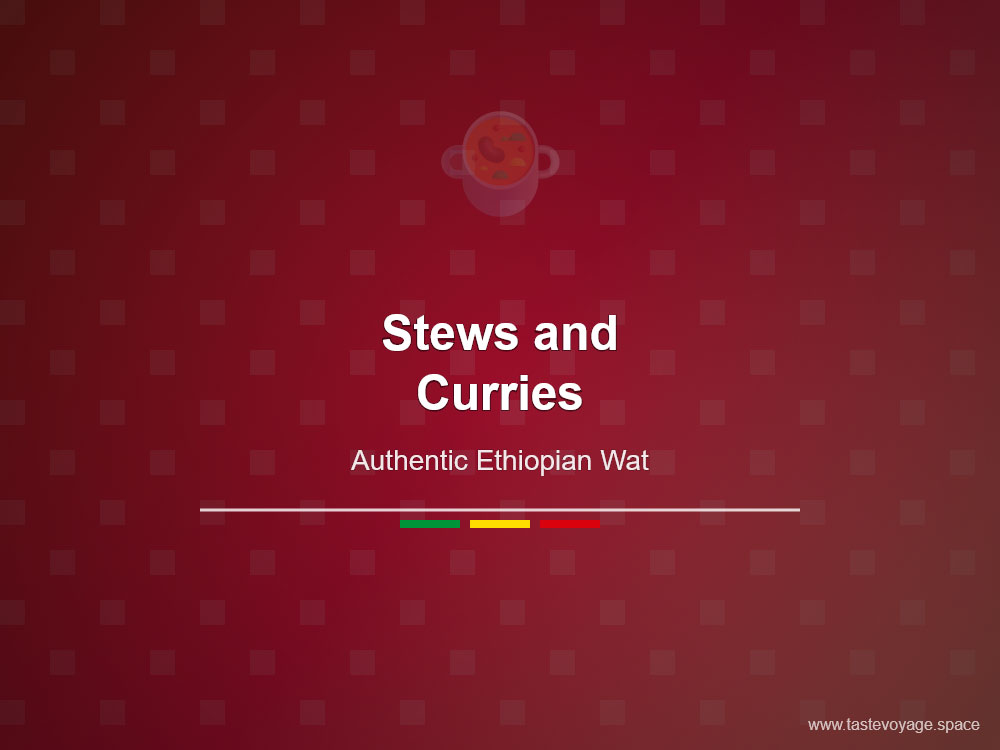Ethiopian Slow Cooker Wat: Easy, Authentic Adaptations
Travel the World Through Food >> Ethiopian Cuisine>>Stews and Curries>> Ethiopian Slow Cooker Wat: Easy, Authentic Adaptations
Ethiopian Slow Cooker Wat: Easy, Authentic Adaptations
Discovering Ethiopian Slow Cooker Wat: A Culinary Treasure
Ethiopian Slow Cooker Wat is more than just a hearty stew; it is a vibrant expression of Ethiopia’s rich culinary heritage. This dish exemplifies the artistry of Traditional Cooking methods combined with the convenience of modern appliances. It beautifully captures the essence of Ethiopian flavors and culinary practices, making it a must-try for food enthusiasts worldwide.
The Cultural Significance of Wat
In Ethiopia, Wat holds a special place at the heart of communal and family gatherings. It is often prepared for special occasions, religious celebrations, and everyday meals, reflecting the importance of shared food in Ethiopian society. The dish’s versatility allows for various ingredients, from chicken and beef to lentils and vegetables, each carrying its own cultural stories and traditions.
Ethiopian cuisine is renowned for its bold spices, and Wat exemplifies this with its signature use of Berbere spice blend and Niter Kibbeh, a seasoned clarified butter. These ingredients not only elevate the flavor but also symbolize the deep-rooted culinary techniques passed down through generations. Preparing Wat is considered a labor of love, showcasing the skill and patience valued in Ethiopian cooking.
Culinary Significance and Unique Flavors
Ethiopian Slow Cooker Wat offers a delicious balance of spice, aroma, and texture. The slow-cooking process allows the flavors to develop fully, resulting in a rich, complex dish that delights the palate. It embodies the Ethiopian emphasis on layered flavors and aromatic spices, creating a sensory experience that transports diners to the heart of Ethiopian kitchens.
One of the key features of this dish is its adaptability, allowing cooks to customize ingredients based on availability and preference. This flexibility highlights Ethiopia’s resourceful approach to cooking, turning simple staples into extraordinary culinary experiences. The dish’s deep, savory profile is complemented by its thick, stew-like consistency, making it perfect for scooping with Traditional Injera bread, another cultural icon.
A Modern Twist on a Traditional Classic
Adapting the Ethiopian Wat to a slow cooker brings a new dimension of convenience without compromising its authentic taste. This adaptation makes it accessible to a broader audience and easier to prepare, especially for those with busy lifestyles. Despite the modern approach, the essence of Ethiopian culinary artistry remains intact, honoring traditional flavors with a contemporary touch.
This dish’s versatility also encourages culinary experimentation. Chefs and home cooks alike can explore different proteins and vegetables, creating personalized versions that still pay homage to its cultural roots. The slow cooker method enhances the dish’s depth, making it an inviting centerpiece for any meal.
Celebrating Ethiopian Cuisine
Ethiopian Slow Cooker Wat serves as a culinary ambassador, showcasing the vibrant flavors and cultural richness of Ethiopia. It invites food lovers to explore a world of complex spices, hearty textures, and communal traditions. Whether enjoyed for a special occasion or a comforting weeknight meal, it embodies the warmth and generosity characteristic of Ethiopian hospitality.
In conclusion, Ethiopian Slow Cooker Wat is more than a delicious dish; it is a celebration of Ethiopian heritage and culinary ingenuity. Its adaptability and profound flavors continue to inspire cooks around the world, fostering appreciation for Ethiopia’s vibrant food culture. Embrace this dish and experience a taste of Ethiopia’s rich culinary legacy.
Explore More
Interested in learning about Ethiopian cuisine? Stay tuned for more insights into traditional dishes, their history, and modern adaptations. Discover how this vibrant culinary tradition can enrich your own cooking repertoire and bring a touch of Ethiopian warmth to your table.
